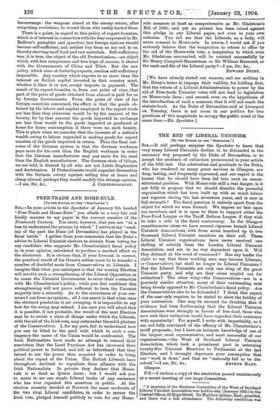[To TER EDITOR OF TER " SPEOTATOR:1
Sra,—In your article in the Spectator of January 9th headed "Free-Trade and Home-Rule" you allude in a very fair and kindly manner to my paper in the current number of the Nineteenth Century. You state, however, that you are "at a loss to understand the process by which" I arrive at my "read- ing of the part the Duke [of Devonshire] has played in the fiscal battle?' I gather from your comments that the Duke's advice to Liberal Unionist electors to abstain from voting for any candidate who supports Mr. Chamberlain's fiscal policy is, in your opinion, calculated to produce a marked effect on the electorate. It is obvious that, if your forecast is correct, the practical result of his Grace's action must be to transfer a number of doubtful seats from Conservatives to Liberals. I imagine that what you anticipate is that the coming Election will involve such a strengthening of the Liberal Opposition as to cause the Unionist Government to sever their connection with Mr. Chamberlain's policy; while you feel confident this strengthening will not prove sufficient to turn the Unionist majority into a minority. As to the correctness of your sur- mises I can form no opinion ; all I can assert is that when once the electoral pendulum is set swinging, it is impossible to say how far the swing may extend. I am sure you will admit that it is possible, if not probable, the result of the next Election may be to create a state of things under which the Liberals, with the aid of the Irish vote, may outnumber the solid phalanx of the Conservatives. I, for my part, fail to understand how you can be blind to the peril with which in such a con- tingency the cause of the Union would be confronted. The Irish Nationalists have made no attempt to conceal their conviction that the Land Purchase Act has increased their political power in Ireland, and tell •us beforehand that they intend to use the power thus acquired in order to bring about the repeal of the Union. The British Liberals have throughout declined to repudiate their alliance with the Irish Nationalists. In private they declare that Home- rule is as dead as Queen Anne ; but I would ask you to name to me one single Liberal leader of any eminence who has ever repeated this assertion in public. At the election recently decided at Norwich the more moderate of the two rival Liberal candidates, in order to secure the Irish vote, pledged himself publicly to vote for any Home-
rule measure at least as comprehensive as Mr. Gladstone's Bill of 1886; and yet no protest has been raised against this pledge in any Liberal paper, not even in your own columns. You tell me that the Liberals, as a body, will never consent to Home-rule. In return, I would ask if you seriously believe that the temptation to return to office by the aid of the Home-rule vote, a temptation to which even Mr. Gladstone succumbed, will be resisted successfully by Sir Henry Campbell-Bannerman or Sir William Harcourt, or the rank-and-file of the Liberal party am, Sir, &c.,
EDWARD DicEir.
[We have already stated our reasons, and see nothing in Mr. Dicey's letter to impugn their validity, for holding, first, that the return of a Liberal Administration to power by the aid of Free-trade Unionist votes will not lead to legislation on Home-rule lines ; and second, even on the hypothesis of the introduction of such a measure, that it will not reach the statute-book. As the Duke of Devonshire said at Liverpool on Tuesday, there is not room in our politics for two questions of this magnitude to occupy the public mind at the same time.—En. Spectater.1










































 Previous page
Previous page